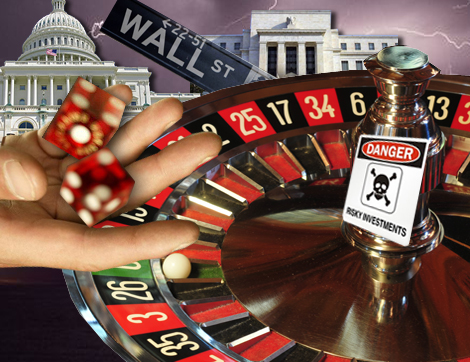
• Congressmen approve reduction in oversight for risky investments
By Mark Anderson
A fundamental thing that Americans need to fathom these days is that Wall Street is writing the nation’s banking laws—and now it’s bullish on amending the 2010 Dodd-Frank Wall Street Reform and Consumer Protection Act. Indeed, the nation’s top financial vultures keep circling the Capitol, intent on significantly altering Dodd-Frank even before it’s finally implemented. And they’ve made enough progress to justify calling on AMERICAN FREE PRESS readers to sound the alarm.
Citigroup is the main culprit. It’s acting as a virtual unofficial division of Congress in order to make sure that “impersonal market forces” forever smile upon Wall Street. But the “free market” really means freedom from any meaningful regulation—with the provision of nearly total protection at the same time—for those huddled at the top of the financial pyramid. It means privatizing the profits for a select few bankers while saddling the rest of us with their losses.
An overview of this ongoing infamy posted at AllGov.com, a comprehensive online resource that broadly monitors the federal government, noted: “A Citigroup lobbyist . . . was primarily responsible for authoring the Swaps Regulatory Improvement Act,” a bill approved by the House of Representatives 292-122 in early November.
The word on Capitol Hill is that this bill, which the White House claims to oppose, would wipe out Section 716 of Dodd-Frank, “Prohibition Against Federal Government Bailouts of Swaps Entities.” That section “requires banks to use a non-bank entity for trading commodity, energy and other swaps.
In other words, if the legislation becomes law, financial institutions could return to conducting high-risk trading with funds that are backed by the FDIC (i.e. the taxpayer),” AllGov.com pointed out, while adding: “Citigroup was responsible for recommendations made in 70 lines of the 85-line bill,” citing the research of New York Times writers Eric Lipton and Ben Protess.
According to these reporters, the bill contains a couple of essential paragraphs copied “word for word” from a draft submitted by Citigroup, which Citigroup had developed “in conjunction with other Wall Street banks,” AllGov.com also noted. Thus, Wall Street institutions, if they get their way, could return to gambling with risky “investments” and make the taxpayer cover their losses again if they make bad bets.
Dodd-Frank’s basic intent is to prevent banks from using monies backed by the Federal Deposit Insurance Corporation to invest in “swaps,” among other high-risk derivatives. This prohibition was adopted because Wall Street players invested trillions of dollars in risky derivatives before seeking public assistance five to six years ago. Before it was all over, taxpayers were on the hook for as much as $17 trillion to bankers. While banks have paid back some of this money—thanks largely to loans at near zero-percent interest from the Federal Reserve—to this day, no one knows for sure just how much taxpayers lost bailing out the biggest banks.
Representative James A. “Jim” Himes (D-Conn.)—a former Goldman Sachs banker who co-sponsored H.R. 992, and who’s among the top recipients of Wall Street campaign donations—played the role of “shocked” Congressman: “It’s appalling, it’s disgusting, it’s wasteful and it opens the possibility of conflicts of interest and corruption,” he was quoted as saying in the Times. “It’s unfortunately the world we live in.”
But it wouldn’t be “the world we live in” if Congress would start consistently representing the general public and stop continually carrying water for a tiny fraction of society that helps decide the rules for the money system itself. And since not calling Congress ensures nothing will change, AFP readers are urged to make such financial issues a regular reason for contacting their representatives in Washington and in their home districts.
And in terms of this Dodd-Frank debacle, not calling Congress ensures nothing will change, AFP readers are urged to make such financial issues a regular reason for contacting their representatives in Washington and in their home districts. Issues such as this, take note, resonate across a broad cross section of the political spectrum and therefore provide a way for the American people to unify en masse in pressuring Congress—creating the kind of pressure they’ll feel. A timely move would be to contact the Senate to make sure this tinkering with Dodd-Frank stops there. Call any Senator or House member at 202-224-3121 or 225-3121.
Issues such as this resonate across a broad cross section of the political spectrum and therefore provide a way for the American people to unify en masse in pressuring Congress—creating the kind of pressure they’ll feel.
A timely move would be to contact the Senate to make sure this tinkering with Dodd-Frank stops there. Call any senator or House member at 202-224-3121 or 225-3121.
Mark Anderson is AFP’s roving reporter. Listen to Mark’s weekly radio show on the AMERICAN FREE PRESS RADIO NETWORK.


